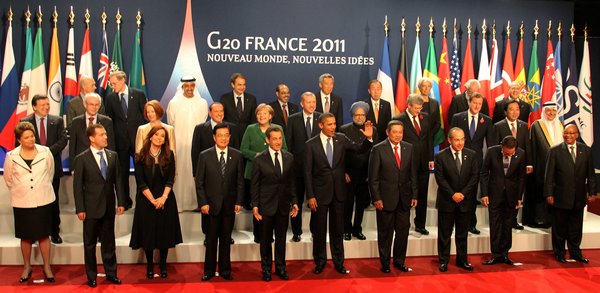China shuns EU bailout fund
- By He Shan
 0 Comment(s)
0 Comment(s) Print
Print E-mail
China.org.cn, November 4, 2011
E-mail
China.org.cn, November 4, 2011
 |
|
Heads of State and Government pose for the group picture at the G20 summit in Cannes, France, 3 November 2011. On 3 and 4 November 2011, the heads of state of the leading world economies (G20) meet for this year's summit.?[CFP] |
After a painstaking negotiation yesterday afternoon at the G20 Summit in Cannes, the Chinese government decided not to invest in the special purpose investment vehicle proposed by the European Financial Stability Facility, shattering the eurozone's hopes of receiving a fiscal lifeline from China.
After EU debt woes spread among its indebted members, EU leaders appealed to emerging countries such as China, Russia and Brazil for financial aid to bail it out of its debt crisis.
"The EFSF is a significant vehicle to tackle with EU debt crisis and is rated AAA,"China's vice finance minister Zhu Guangyao said Thursday. "But because details about the new fund are scant, it is too early for China to discuss further investment in the expanded bailout fund."
Klaus Regling, chief executive officer of the EFSF, flew to Beijing last weekend to persuade China to put money in the bailout fund, but he claimed that it was just a normal visit.
Asked about the possibility that China could offer a further assistance, Regling did not comment directly. He said a special purpose investment vehicle is a worthy option for investors because it is guaranteed by European governments.
Regling also pointed out that China has purchased EFSF bonds, but declined to reveal how much the country has purchased.
The special purpose investment vehicle, specially created by the EFSF as an investment vehicle, would issue bonds using money from private capital, sovereign wealth funds and the International Monetary Fund.
China's business press carried the story above on Friday.





